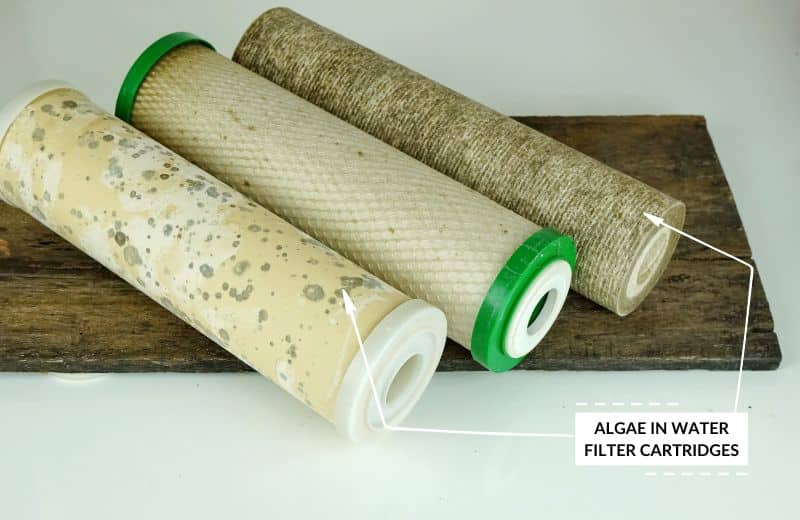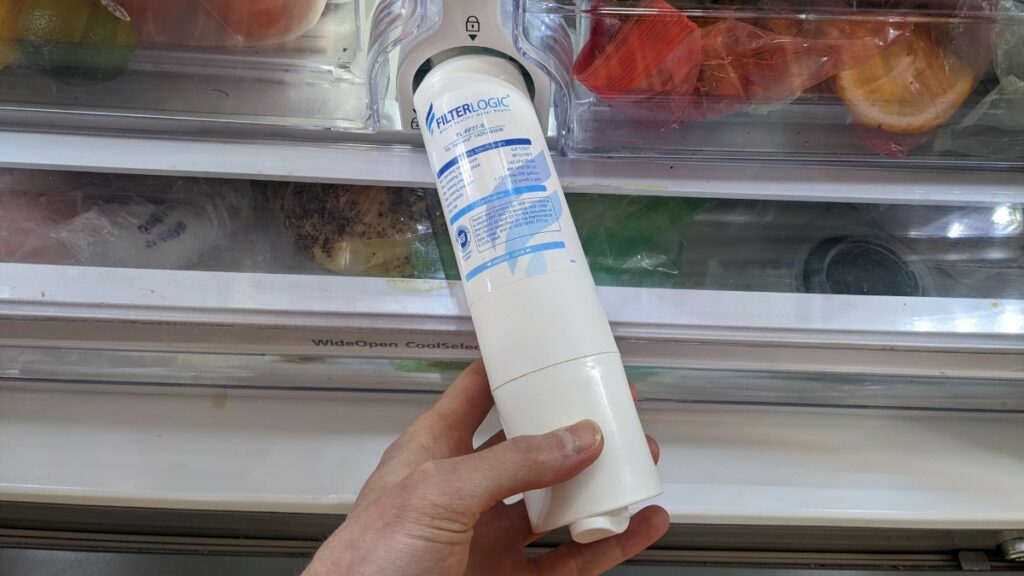Wondering, “How often should I change my water filters?” We’ve answered your question in this guide.
📌 Key Takeaways:
- You need to replace your water filter after 2-12 months on average, depending on the filter size and type.
- Replacing filters is essential to ensure adequate long-term filtration and prevent dangerous bacteria buildup.
- Signs you need to change your water filter are slow flow rate, poor-tasting or smelling water, and a dirty water appearance.
Table of Contents
📤 Why Do You Need to Replace a Filter?
Unfortunately, no filter lasts forever.
The main reason why you need to replace your water filter is that the filter will eventually become so clogged with contaminants that the space for water to pass through becomes minimal. As a result, flow rate will slow significantly.
If you continue to use the filter for weeks or months beyond its anticipated lifespan, the filter media may degrade to the point that holes form, allowing trapped contaminants to re-enter your water.
The filter’s damp, dirty environment may also cause bacteria, mold, or other harmful microorganisms to accumulate in the media.
Replacing the filter is essential if you want to enjoy continued high-quality filtration, with no risk of recontamination.

🔂 How Often to Replace Water Filter
On average, you need to replace the filters in your filtration system once every 2-12 months. Some filters last longer than this, depending on their size and type.
We’ve shared the average filter lifespans for popular filter types below. Remember, though, all filters are unique. It’s best to check the information in your user manual to know exactly how often to change your filter.
| Filter Type | Average Replacement Frequency |
|---|---|
| Pitcher or Dispenser | 2-4 months |
| Faucet | 2-4 months |
| Whole House | 6, 9, or 12 months |
| Refrigerator | 4-6 months |
| Under Sink | 6-12 months |
| Shower | 6 months |
| Reverse Osmosis | 6 months to 2 years |
How Often To Replace Filter in Water Pitcher or Water Dispenser
Wondering, “how often should I change the filter in my water pitcher or dispenser?
📌 Most water filter pitchers need a new filter every 2-4 months.
Pitcher filters have shorter lifespans than other filters because they’re small and use gravity filtration, so once they become clogged, the flow rate will decrease to a drip.
Some pitcher filters, such as the Brita Elite (previously known as LongLast), last up to 6 months, but this is a rare exception for pitcher filters. The best filters remove too many contaminants – clogging at a faster rate – to last this long.
How Often To Replace Faucet Water Filter Cartridge
Wondering how long the average faucet filter lasts?
📌 You’ll need to replace the filter in a faucet filtration system every 2-4 months.
Faucet filters are powered by water pressure, which means the flow rate shouldn’t drop too much when the filter reaches the end of its lifespan. But, like pitcher filters, these filters are pretty small, which limits their lifespan somewhat.

How Often To Change Whole House Water Filter Cartridges
A whole house water filter system, installed at your main supply line, has the biggest filter cartridges of all, which is good news regarding filter lifespan.
📌 The average whole house water filter system contains filters that need replacing every 6, 9, or 12 months.
Different filters in whole house water filtration systems might have different lifespans. For instance, the sediment filter, which protects the later filter stages from contaminant damage, might need replacing the most frequently, because it gets clogged faster from the largest particles.
How Often To Change Refrigerator Water Filter
Refrigerator water filters are small, compact filters, which means they have relatively short lifespans.
📌 You’ll need to replace a refrigerator water filter at least twice a year.
This should prevent clogging, which will affect the taste and odor of your water.
In-line refrigerator water filters tend to last longer than integrated filter types or built-in refrigerator water filter models (about 6 months versus 2-4 months), but always check your user manual if you’re unsure.

How Often To Replace Under-Sink Filters
Under-sink filter systems often have two or three separate filter cartridges, typically including a sediment filter, a carbon filter, and a polishing filter, all requiring changing at different time frames.
📌 The average filter lifespan for under-sink systems is 6-12 months.
Sediment pre-filters usually have the shortest lifespans of about 3-6 months. Carbon filters last around 9 months, and polishing filters last 9-12 months.
How Often To Change Shower Filter
A shower filter is powered by water pressure, but it has to be pretty small and compact to blend in with your shower unit.
📌 Most shower filters need replacing after 6 months.
Occasionally, we see shower filters that last up to 2 months, but 6 months is much more common.
How Often To Change Filters In A Reverse Osmosis System
A reverse osmosis system usually contains four filters: a sediment filter, a carbon filter, a reverse osmosis membrane, and a carbon polishing filter.
📌 The average lifespan of the filters in a reverse osmosis system is 6 months to 2 years.
The reverse osmosis membrane has the longest lifespan on average of 2 years – that’s only if you change the sediment pre-filter every 6 months, and the carbon filter every 9 months. The carbon polishing filter usually lasts about 12 months.

📖 Factors Affecting How Often You Need a New Filter
The lifespan of the filters in your water filtration unit is only the manufacturer’s estimate. The exact filter lifespan depends on:
- Your water quality. Poor-quality water with more total dissolved solids will clog a filter faster than high-quality water, reducing filter lifespan. City water is typically better quality than well water.
- Your water usage. The more water you use per day, the quicker the filter will become clogged.
- The filter size. A large filter has a bigger surface area to trap more contaminants, so it’ll last longer than a small filter.
- The filter’s contaminant removal abilities. A filter that can purify water by removing hundreds of contaminants will become clogged quicker than a filter that has limited contaminant removal abilities.
🔎 How to Know When To Replace A Filter
Wondering how to know when it’s time to replace the filters in your system? Here’s what to look out for:
- Your water quality drops. You should have noticed a significant improvement in your tap water quality when you installed your filter. If you notice an unpleasant taste or your water starts to smell funky, it’s probably time for a filter change.
- Filter clogs. The water flow from your filter should gradually decrease as the filter clogs with harmful contaminants. It’s time to change your filter when the water flow is about one-third of the original flow rate.
- Dirty appearance. A good filtered water system should produce crystal-clean water, free from dirt or harsh sediment. If your water starts to look dirty, replace the filter.

❔ How Often to Change Water Filter: FAQ
How often should drinking water filters be changed?
Drinking water filters should be changed every 2-12 months on average, depending on your water usage, the filter size, the system type, and your water quality.
How long do water filters really last?
Water filters last for about 2-12 months, depending on the filter type. It’s difficult to say how long a filter really lasts. If your water is only mildly to moderately contaminated, the filter should really last as long as the manufacturer predicts. But if your water is heavily contaminated, the filter might need changing 1-2 months earlier than anticipated.
What happens if you don’t change the water filter?
If you don’t change your water filter on time, you might notice that the flow rate slows significantly and your water starts to taste or smell bad. Not changing the filter on time can also cause bacteria to build up in the filter media.
Can you drink water right after changing the filter
Yes, you can drink water right after changing the filter, but you might need to prime the filter first. This is usually done by flushing the filter under running water or soaking it in water. Check the user manual if you’re unsure.

